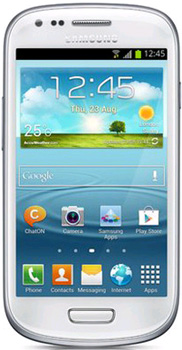| Review of the Samsung Galaxy S3 Mini |
 |
The Samsung Galaxy S3 Mini has been around for approximately a year, but it was only released in Canada on October 4th of 2013. It sells for around $250 off-contract, and it therefore competes with the newly-minted Motorola Moto G, which has set a new standard for what to expect in a low-end phone. Last Updated: 13-Dec-2013 |
Before reading this review,
please read Some Thoughts on Phone Reviewing.
The newest version of the firmware for this device does bring to bare a number
of features that were originally released on the
Galaxy S4, and so when it comes to
software features, the phone is no slouch. Its technical underpinnings however
are nothing like the S4 however.
RF Performance
In this respect the phone acquits itself well, with virtually identical
performance to the S4 in both HSPA and LTE. When signals are weak it pulls them
in just as well, and then provides similar ping times and data transfer rates.
Compared to the Moto G the S3 Mini has the added benefit of LTE support, which
might be worth the extra $80 to you. Otherwise, in HSPA the phone ties with the
Moto G for RF sensitivity, transfer rates, and ping times.
WiFi Performance
As usual, WiFi testing was performed in my basement with the phone connected to
my upstairs access point. The signal from that access point is middling and
provides an excellent way to see how well phones deal with so-so WiFi signals.
Surprisingly the S3 Mini doesnít do well for itself here, as it suffers from the
same issue Iíd noticed in both the Moto G and the
Moto X. While downlink speeds are fine
(though not nearly as good as the S4), it has considerable trouble with the
uplink. The uplink cap on my home internet is 3 Mbps, which should be a walk in
the park for all but a poor WiFi connection. Most phones can readily achieve the
full 3 Mbps speed, but the S3 Mini, like the Moto G and Moto X, have a hard time
getting to the halfway mark (usually averaging around 1.3 to 1.5 Mbps).
Compared to the Moto G then, the S3 Mini essentially ties it in this category.
Both seem to suffer from the same performance problem, but in doing so they are
no better (or worse) than one another.
Perhaps the biggest surprise for me during my testing of the S3 Mini was the
overall WiFi performance of a super-cheap low-end Huawei Y300 I happened to be
testing at the same time. Despite its ultra-low-end status, the WiFi performance
of the Y300 was very good. I therefore canít see that the lesser performance of
the S3 Mini and Moto G was a result of necessary cost-cutting.
Audio Performance
The incoming call audio on the S3 Mini is strikingly similar to the S4, in both
volume and tonal balance. Like the S4, it also includes a feature that allows
you boost the audio level if you find yourself talking with a faint caller, or
you are in a noisy environment. The earpiece has a nice sound to it, with just
enough low-end to seem reasonably rich, especially on male voices.
The speakerphone performance is also quite close to that of the S4, though there
seems to be a bit more sympathetic vibration in the casing than you find on the
S4.
The Moto G also does well here, but it turns in poorer speakerphone performance
by providing very little volume. The S3 Mini therefore edges out the Moto G in
this category.
Multimedia Audio
Not surprisingly the S3 Mini also seems to match the S4 in multimedia audio
performance. This probably means they use the same speaker, and it explains why
speakerphone performance is also close. This means that the S3 bests the Moto G,
proving that it has better audio chops than the Motorola.
Display
In this department the S3 Mini looses big-time. Not only does it provide only
800 x 480 screen resolution on a 4-inch display, vs 1280 x 720 on a 4.5-inch
display on the Moto G, but also uses the dreaded Pentile sub-pixel arrangement.
At this low resolution the Pentile sub-pixels are very detectable and for some
people itís horrifically annoying. In fact, itís like going back in time to the
original Galaxy models, which had 800 x 480 screens that measured 4 inches and
used the Pentile sub-pixel arrangement. I compared the S3 Mini to my old (and
now retired) Captivate and both of them looked just as out-of-date. While the
Moto G does have those annoying horizontal lines that are sometimes visible, its
screen quality totally blows the S3 Mini out of the water. This isnít just a
slight loss for the Samsung, this is a MAJOR LOSS.
Here's a photograph of the screen:

Camera
There isnít much to say here, because the S3 Mini comes with a fairly lackluster
5-megapixel camera that provides approximately the same level of image quality
as the Moto G. You do however get the same great camera software as the S4, but
with a number of features missing. One of the very sad omissions was HDR, which
in many photographic situations can worth its weight in gold.
As far as which camera is better, itís really difficult to say. Both have things
they do better than the other, but in the final analysis neither is going to
make you want it because of its camera. At this end of the market a camera is
just a convenience feature that allows you to take snapshots for quick inclusion
on your social media streams. You wouldnít make the mistake of using either the
Moto G or the S3 Mini for anything else.
GPS
The GPS chipset in the S3 Mini seems to be the same one as the S4. Both can lock
onto GPS and Glonass satellites and once locked they donít loose them for no
apparent reason as the Moto G does. The GPS receiver is also quite sensitive,
easily finding 13 to 16 out of 22 satellites in my basement. The Moto G would be
comparable if it didnít have that nasty habit of loosing of the Glonass
satellites from time to time.
Processor and Chipset
The S3 Mini uses a dual-core 1.2 GHz processor with a single-core Mali-400 GPU.
The Moto G also has a processor clocked at 1.2 GHz, but its case you get
quad-core with a much more powerful Adreno 305 GPU. While the S3 Mini is a
fairly capable phone, the performance difference between it and the Moto G is
quite noticeable when you play with them side-by-side. The S3 Mini works well
enough, but it lacks the smooth performance that the Moto G delivers, even on a
higher-resolution screen.
Like the Moto G, it has only 1 GB of RAM, and the one I tested also had only 8
GB of internal storage. You can expand the storage with a MicroSD card, which is
something the Moto G lacks.
Battery Life
Battery drain is a little steep, but not unusual given the small size of the
battery (just 1500 mAh). Using Battery Monitor Widget to estimate
time-until-dead I found that the phone would only manage 4 hours with JUST THE
SCREEN ON (that is, doing nothing else). Once you do things that run the
processor the battery drain increases, and so 2 to 3 hours of screen time is a
fair estimate and this isnít that good.
The Moto G comes with a 2070 mAh battery, and while that isnít large by any
stretch itís 38% bigger than the one in the S3 Mini. This seems to approximate
the longer battery life I saw on the Moto G.
Conclusions
Overall the S3 Mini is actually a pretty decent phone, but it really misses the
boat with its tiny low-res screen of yester-year. It beats the Moto G in overall
audio quality, both in phone calls and in multimedia, it has a removable
battery, a MicroSD slot for memory expansion, and it provides LTE whereas the
Moto G does not. However, it has less smooth performance and only a dual-core
processor instead of a quad-core, plus one of the worst screens on the market
today.
Should you buy an S3 Mini instead of a Moto G? A lot depends on what you feel is
most important to you. Itís actually a pretty tough choice to make, but it might
come down to what price you can get the S3 Mini for. Except for sales, the S3
Mini is $80 more expensive than the Moto G at the time of this writing, but this
could change in the coming moths.
Both phones DO NOT give you the sort of performance and features youíll get in a
high-end smartphone, like the Galaxy S4, the HTC One, the LG G2, or the Nexus 5,
but they cost a LOT LESS and yet they donít force you to make horrendous
compromises.
If it was me making decision, Iíd have to take a pass on the S3 Mini solely
because of his horrible screen. I just couldnít go back to a screen that small
or that unrefined.